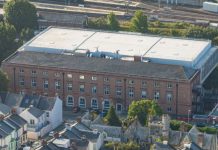Commercial property investment in the South West during 2021 is set to focus on well-let and well-located distribution units, according to global real estate advisor Colliers International.
In an overview of the regional market, Richard Coombs, director in the National Capital Markets team with particular responsibility for investment in the South West, noted: “As 2021 gets underway with the effects of the pandemic creating more of the turbulence that characterised 2020, it seems reasonable to predict that the key theme for capital markets this year will be mitigating risk, with investors prioritising long term income over more high-yielding, riskier assets.
“In terms of what this means for Bristol and the South West, we anticipate that strongest investor demand will continue to be for well-let and well-located distribution units across the region.
“Industrial has already been very much the hot sector for investors in 2020, driven by its pivotal role during the COVID-19 crisis as consumers turned to ecommerce and grocery companies. Other investment attractions of industrial have been strong demand, rental growth and a relative lack of supply on the whole across the sector, together with long leases, often coupled with indexation.
“In addition to investor focus upon industrial, we are expecting to witness the rising popularity of the residential sector combined with a growing investor appetite for the PRS (Private Rented Sector) model.”
South West total investment volumes for 2020 were £1,291.50 million compared to investment volumes of £1,792.82 million in 2019, reflecting a 28 per cent decline year on year. The largest transaction in the region involved developer Panattoni UK selling the forward funding of their 2.3 million sq ft warehouse pre-let in Swindon to Legal & General Investment Managers (LGIM) for in excess of £200 million at a yield of 4.3 per cent.
Bristol investment volumes for the year were £529.38 million compared to £588 million in 2019, and Richard Coombs commented: “It is of particular note that despite challenging market conditions the 2020 figures for Bristol show a fall of just 10 per cent in investment volumes compared to 2019 levels, which bodes well for the market in 2021.
“There were two significant student transactions during the year; DWS’ forward purchase of F3GROUP’s 357 bed scheme in Redcliffe for £57 million and Print Hall a 267 bed scheme that completed in 2017 was purchased in a joint venture between Harrison Street and GSA for £58.2 million.
“Away from the student sector, other notable transactions during the year included British Land’s sale of the Tesco Extra in Brislington to Tesco for £42 million, Abstract’s sale of Babcock’s office at Bristol Business Park to Aviva for £55.195 million and Tesco Pension Fund’s forward funding of the 116,133 sq ft Grade A office development Halo, Finzels Reach, for £69.4 million.”
He added that as one of the UK’s Big Six cities, Bristol appeared to be well-placed for continuing office, industrial and residential development.
“The city centre has always been a strong office location, with the lowest Grade A vacancy rate of major UK cities. This has been reflected in strong rental growth in recent years, with a record rent of £37.50 per sq ft being achieved in 2019, which was the highest top rent in UK regional city office markets.
“Although the Bristol office market will undoubtedly see some changes as a result of the pandemic and employees having to work from home, there could be opportunities for landlords to remodel some of their buildings with an enhanced focus on collaborative space. For many employers this will be essential for maximising their office space and is likely to be a key driver in encouraging employees back to their offices in 2021.”






















